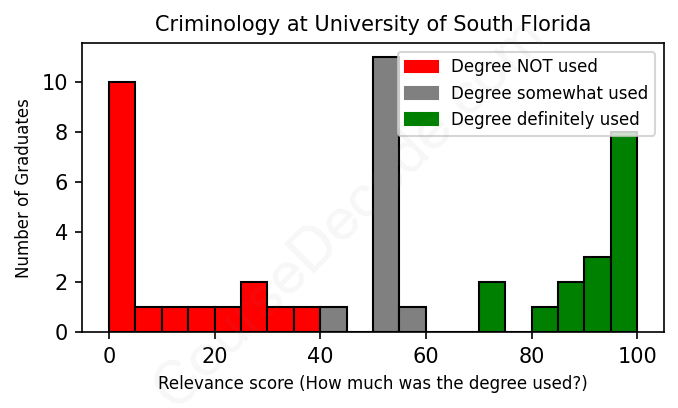
First, some facts. Of the Criminology graduates from University of South Florida we've analyzed , here's how many have used (or NOT used) their degree in their career:

These are estimates based on AI analysis of 47 LinkedIn profiles (see below).
The verdict? Significantly below average. Overall, with an average relevance score of 49%, Criminology graduates from University of South Florida have a much lower likelihood (-18%) of finding work in this field compared to the average graduate across all fields:
And for comparison, here's the chart for all profiles we've looked at across all degrees.
Also, after graduating, only 21% of these graduates have pursued further education other than another Bachelor's degree (such as a Masters degree or other), compared to the average across all profiles of 35%. This suggests a Bachelors degree is enough for most Criminology graduates, and it's normal to look for work straight after graduation.
See the details:
|
Relevance score: 35% We think this person has NOT gone into a career related to their degree. We think this person has NOT gone into a career related to their degree.
DEGREE INFOGraduated in 2013 from University of South Florida with a Bachelor's Degree in Criminology. No other secondary education since. JOB HISTORY SINCE GRADUATIONBanking Representative The Bank of Tampa Jun 2013 - Sep 2014 Cage Cashier  Seminole Hard Rock Hotel & Casino Tampa Jan 2015 - May 2015 AML Compliance Analyst  Real Soft, Inc. Jun 2016 - Mar 2017 Money Room Attendant  Aramark Jun 2015 - Feb 2019 Money Room Attendant  Legends Mar 2019 - Dec 2019 Associate Analyst II  AML RightSource Mar 2020 - Jul 2021 Senior Analyst I  AML RightSource Jul 2021 - Jul 2022 Central Operations Associate  Amazon Jul 2020 - Dec 2023 Financial Crimes Specialist  Wells Fargo Jul 2022 - May 2024 ABOUTNo information provided. |
The top 10 most common jobs done by the graduates we've analyzed (ranked most common to least) are:
After checking out the job profiles of folks who graduated with a Criminology degree from the University of South Florida, it seems like a mixed bag when it comes to the relevance of the jobs they landed. A few common roles pop up, particularly in law enforcement and criminal justice-related fields, like police officers, deputy sheriffs, and various roles at sheriff's offices. Those positions definitely tie directly back to criminology, as they involve a solid grounding in understanding criminal behavior and the justice system. Another interesting thing is that many graduates took up roles in compliance and fraud investigation, especially in banks or companies like Robinhood. These jobs utilize the criminological principles around crime prevention, investigation, and regulations. So, it's clear that there are meaningful opportunities out there that align well with their studies.
On the flip side, quite a few grads ended up in positions that are either pretty loosely related or completely detached from their criminology education, like sales, administrative roles, or hospitality jobs. For example, jobs like being a bartender, an account manager, or a sales associate don’t directly utilize criminology knowledge or skills. This paints a picture of a diverse job market where graduates might not always land roles that align directly with their major. While it's great to see many applying their criminology knowledge in the workforce, it’s also a reminder that having a degree doesn't always guarantee a career directly in that field. It can lead to all kinds of opportunities, some closer to criminology than others!
Here is a visual representation of the most common words in job titles for Criminology graduates (this is across all Criminology graduates we've analyzed, not just those who went to University of South Florida):

When we look at the career trajectories of Criminology graduates from the University of South Florida, it’s pretty clear that many have jumped into roles that are either directly related to criminal justice or closely adjacent fields shortly after graduation. For example, right off the bat, you see some graduates landing jobs as police officers, EMTs, and juvenile probation officers. This shows a strong inclination towards law enforcement and public safety roles. However, not everyone has stuck strictly to the criminology path; some have ventured into various other fields like project management, sales, or even culinary arts. It seems there’s a mix of both focused law enforcement careers and diversifying into non-related sectors.
Fast forward five to ten years down the line, and it’s still a mixed bag. Many people seem to have advanced within the realm of criminal justice, moving up the ranks to positions like senior investigators or compliance analysts, which indicates a solid career trajectory that's aligned well with their degrees. On the other hand, there are quite a few who seem to have transitioned away from criminology into other fields not related to their studies. While there are some success stories of climbing the ladder in relevant careers, there’s also evidence that many graduates have had to pivot significantly or settle for jobs that don’t directly utilize their criminology background. Overall, it’s a little bit of both—the dedicated law enforcement paths and more surprising shifts into unrelated job markets.
Getting a Bachelor’s degree in Criminology, like the one at the University of South Florida, can be a bit of a mixed bag. It’s definitely not the easiest degree out there, mainly because it covers a lot of ground—everything from criminal justice theories to the sociology of crime, and even research methods. Some people find the coursework pretty interesting, especially if they’re into understanding human behavior and societal issues, but it can also get heavy with reading assignments and papers. So, it’s probably fair to say it’s average in terms of difficulty; it requires consistent effort and a genuine interest in the subject, but if you’re motivated, you can definitely handle it!
Most commonly, in the LinkedIn profiles we've looked at, it takes people 2 years to finish a Bachelor degree in Criminology.
So, looking at these USF Criminology grads, it seems like their money-making potential really varies depending on their career choices. Some of the earlier grads seem to be in jobs that typically don’t pay super well, like EMT work or roles in government like code enforcement or clerical positions. On the flip side, a bunch of the more recent grads are landing gigs in law enforcement or analytical roles, which can have decent salaries. There's also a noticeable trend of pursuing multiple jobs or side hustles, which could boost income a bit—but overall, it looks like those who got into specialized fields, especially in tech or law enforcement, might be doing better financially than those who are sticking with more traditional routes. So yeah, if you’re thinking about what to study at college, maybe consider some of those high-demand areas!
Here is a visual representation of the most common words seen in the "about" section of LinkedIn profiles who have a Bachelor degree in Criminology (this is across all Criminology graduates we've analyzed, not just those who went to University of South Florida). This may or may not be useful:

Here are all colleges offering a Bachelor degree in Criminology (ordered by the average relevance score of their Criminology graduates, best to worst) where we have analyzed at least 10 of their graduates:
| College | Score | Count |
|---|---|---|
 California State University, Fresno California State University, Fresno
|
67 | 20 |
 George Mason University George Mason University
|
63 | 27 |
 Arizona State University Arizona State University
|
58 | 17 |
 Missouri State University Missouri State University
|
57 | 11 |
 The Ohio State University The Ohio State University
|
56 | 16 |
 Penn State University Penn State University
|
55 | 16 |
 Florida State University Florida State University
|
54 | 60 |
 West Virginia University West Virginia University
|
51 | 20 |
 University of Maryland University of Maryland
|
51 | 11 |
 John Jay College (CUNY) John Jay College (CUNY)
|
50 | 21 |
 University of South Florida University of South Florida
|
49 | 47 |
 Central Connecticut State University Central Connecticut State University
|
49 | 13 |
 University of Florida University of Florida
|
48 | 21 |
 The University of Texas at Dallas The University of Texas at Dallas
|
48 | 10 |
 Indiana University of Pennsylvania Indiana University of Pennsylvania
|
48 | 20 |
 Mississippi State University Mississippi State University
|
46 | 10 |